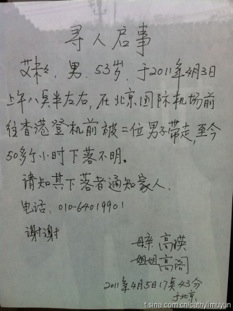China’s Foreign Ministry and official media has confirmed that Ai Weiwei is being held on suspicion of “economic crimes.” From the Guardian:
Foreign ministry spokesman Hong Lei told a regular news conference that it was his “understanding that the public security authorities are investigating Ai Weiwei according to law on suspicion of economic crimes”. State news agency Xinhua had previously published a one-line report announcing the probe, only to delete it within the hour. Asked about criticism by western governments, Hong added: “China is a country ruled by law and will act according to law. We hope that the countries concerned will respect China’s decision. “This has nothing to do with human rights or freedom of expression.”
And the Financial Times has an opinion piece about the insecurity of China’s current crop of leaders which has led to the crackdown on critics like Ai:
This is a government that has budgeted billions to turn itself into a global leader in soft power, and which just last month claimed to have established a “socialist democratic legal system” that is “scientific, harmonious and consistent”. Yet it also ignores its own laws and arrests some of its bravest advocates of gradual legal reform, as well as its most renowned modern artist. Mr Ai, a vocal critic of Communist party rule, was led away by security officers at Beijing airport on Sunday morning and has not been heard from since. The explanation lies in the chronic insecurity that pervades modern Chinese society, after 30 years of breakneck economic and social reform. The party today is led by people who suffered terribly in the madness of the Cultural Revolution (1966-1976), and are thus fixated on preserving stability. Yet, as anyone who has visited China can attest, the country is pleasantly free from street crime, despite its citizens’ surprisingly heightened state of anxiety. In a national survey published by the party’s own mouthpiece media group in December, 73.5 per cent of respondents identified themselves as belonging to the “vulnerable” portion of society. More notably, nearly half of all government officials also count themselves among the same group, despite their enormous power in China’s one-party system. In a similar vein, many of the most ardent patriots and angry nationalists hold foreign passports, and send their children abroad for a western education and an offshore haven if things turn ugly at home. At the heart of this insecurity is the understanding that China, just as it has been for millennia, is ruled by individuals who make use of weak institutions, including the legal system, to achieve their own objectives.
Ai Weiwei’s family has said the allegations of economic crimes are unfounded, and his mother has posted “Missing Person” posters around their home in Beijing to ask for his release. Evan Osnos writes on his New Yorker blog:
Earlier this week, while foreign governments called on China to release Ai, China’s most famous artist, from detention or state his whereabouts, Ai’s family took a more immediate strategy. They wrote out a flyer. Hand scribbled, and signed by Ai’s mother and his older sister, the flyer was photographed and circulated online, though, each time it popped up on the Web, it was censored moments later. His mother confirmed for me the authenticity. (I wrote a Profile of Ai for The New Yorker last year.) This was not a piece of art; it was an earnest appeal. Across the top, they wrote “Missing Person”: Ai Weiwei, male, 53 years old. On April 3, 2011 around 8:30, at Beijing Capital International Airport, before boarding a flight to Hong Kong, he was taken away by three men. More than fifty hours later, present whereabouts remains unknown. Please, anyone who knows the whereabouts of the above, contact the family
See also:
- “Art and political world worried for Ai Weiwei” from Swissinfo.ch
- “China artist’s arrest is wider warning” from BBC
- “Under this surreal ‘rule by law’, Ai Weiwei is guilty” by Isabel Hilton in the Guardian, in which she explains the crucial distinction between “rule of law” and “rule by law.”








